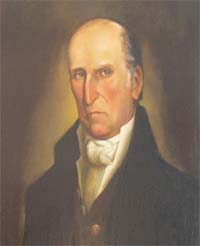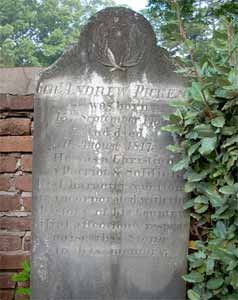As I studied the American War for Independence while writing the Yankee Doodle Spies novels, the name of Andrew Pickens seemed to appear at crucial moments in the Southern Campaign. Who was this man? When thinking of the American Revolution in South Carolina, the names Francis Marion, William Moultrie, and Thomas Sumter immediately come to mind. I decided it was time to give Pickens his proper recognition.
Frontiersman: This little-known First Patriot was one of the leading South Carolinians and Americans. He was a prominent frontiersman, successful farmer, and accomplished soldier who later served as a South Carolina representative in Congress. Andrew Pickens was born in Pennsylvania in 1739. The son of Scots-Irish immigrants, at thirteen, Pickens moved with his family to find land further south. They traveled the route many Scots-Irish took at the time: down the Shenandoah Valley, where they settled for a while in Augusta County, Virginia. Eventually, they moved on to South Carolina, settling first near Waxhaws on the North-South Carolina border and finally in Abbeville County, near the Georgia line. The family settled in an area called the Long Canes. Here, Andrew Pickens married. He farmed and raised cattle like many other settlers. The young Pickens became familiar with his Indian neighbors and traded with them.
Patriot: As the American Revolution neared, political sentiments were strong in the South—both for and against. From the beginning, its inhabitants divided into Patriots and Loyalists (or Whigs and Tories). Pickens was an enthusiastic Patriot and quickly became a military leader, initially leading expeditions as a militia captain against the Cherokee, who had allied with the Loyalists in hopes of keeping their lands. In 1779, the British sent soldiers to South Carolina and North Georgia to boost Loyalist support. Now Colonel, Pickens led his three-hundred-man militia in efforts to support the Patriot cause. He defeated a much larger Loyalist force of over 700 men under Colonel Boyd at Kettle Creek in North Georgia, just south of the Long Canes.
Warrior: The victory at Kettle Creek slowed the recruitment of Loyalists on the frontier. But by 1780, the British had taken Charleston, captured the southern Continental Army, and marched inland from the Carolina coast. The situation was dire. When Charleston fell in May 1780, Pickens and other militia leaders surrendered to the British and, under oath, agreed to sit out the war under British protection. However, the Loyalists destroyed his farm and frightened his family, giving Pickens the reason to break his parole and take the field again. He gathered his militia and started waging guerrilla war in retaliation. The war in the South was fierce. Pickens borrowed heavily from Cherokee tactics and employed those skills in partisan warfare. He was brave and clever in leading partisans.
Battle of the Cowpens
In January 1781, British Colonel Banastre Tarlton attempted to destroy an American force led by famed rifleman Daniel Morgan. Pickens was a militia leader in the engagement and played a key role in defeating British Colonel Tarleton. American commander Daniel Morgan decided to use the reputation of the militia as a rabble that wouldn't stand against a disciplined British attack to lure the British in. As they waited for the enemy, Morgan asked them for "just two volleys and then retreat." Easier said than done in most cases. But with Pickens commanding the militia, they did exactly as Morgan asked.
Dan Morgan issues orders at Cowpens
When the British saw the militia retreat, they thought they had won and advanced straight into Morgan's trap. Pickens's men rallied behind the Continentals and participated in the victory, which was crucial for the Patriots in the South. Until then, they had been repeatedly forced to retreat before British forces. For his "spirited conduct" at Cowpens, the Continental Congress awarded Pickens a sword, and the State of South Carolina promoted him to Brigadier-General in the state militia.
Pickens appeared at all the key engagements in the South. Besides Cowpens, Charleston, and Savannah, he was at Augusta, Georgia, when it fell. Pickens was at Ninety-Six for more than one of its many engagements. In numerous skirmishes, he used his knowledge of the Cherokee way of war to flush out the many Tories in their midst.
Fort at Ninety-Six
Citizen: After the Revolution, Pickens acquired land in frontier South Carolina on the banks of the Keowee River, across from the old Cherokee town of Seneca. There, he built a house named "Hopewell" and became a backcountry gentleman. He served as a political middleman between the Cherokees and the new American nation. Although Pickens had begun his military career fighting the Cherokee in the Anglo-Cherokee War, he was well-respected by tribal leaders. They called him "Skyagunsta"—or Wizard Owl. In his later years, he sympathized with Indian causes. Among the whites, he was sometimes known as "The Fighting Elder" because of his Presbyterian beliefs.
Like many frontier settlers, Pickens was a family man. He married Rebecca Floride Calhoun in 1765. They had 12 children. Pickens served as a U.S. Congressman. His son, Andrew Pickens Jr., was governor of South Carolina from 1817 to 1819, and Ezekiel Pickens became lieutenant governor of South Carolina from 1802 to 1804. A grandson, Francis Wilkinson Pickens, also served as governor of South Carolina from 1860 to 1862. Andrew Pickens died near Tamassee, South Carolina, in Oconee County, on August 11, 1817. He is buried at Old Stone Church Cemetery in Clemson, South Carolina.
On a final note, it is said that Pickens's war experiences helped provide the basis for the Mel Gibson film "The Patriot." And there are some overlaps indicating they drew somewhat from it. Clearly, if the writers had stayed truer to Pickens's remarkable life, the film would have been all the better for it. Certainly, our nation is all the better for it.
 |
| Pickens later served in Congress |








I personally would like to see a Post Script of the battle of Ninety-Six. Tory forces, Pickens forces and route. Fine as this is, mine is just a personal preference.
ReplyDeleteThis is one my great uncles. My grandfather was a pickens i was able to trace back to the wizard owl using Archives.
ReplyDelete